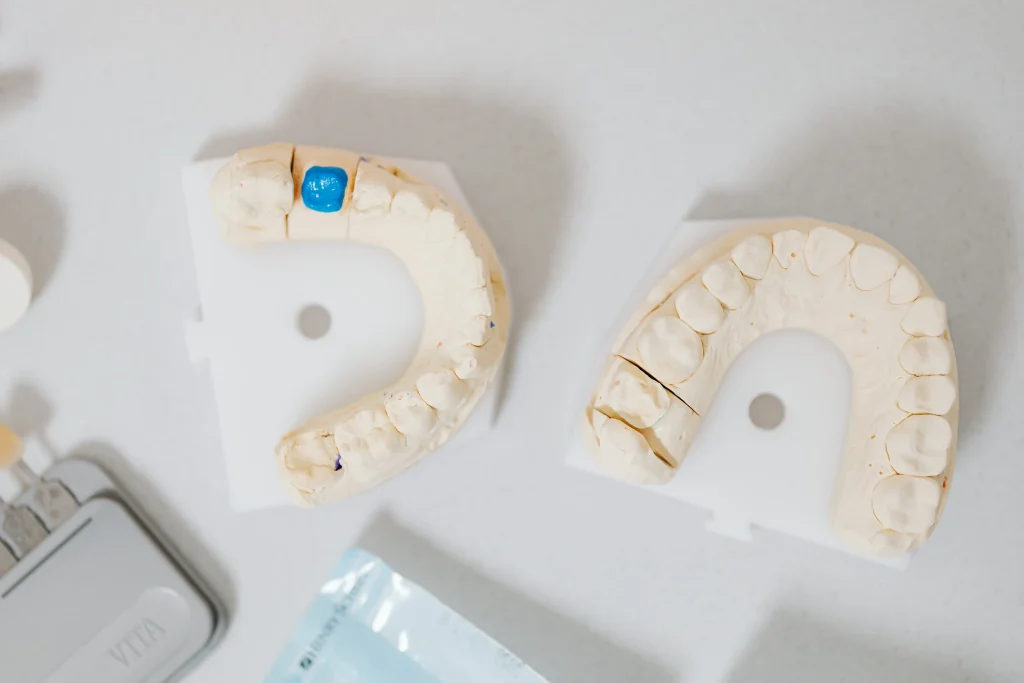Don't panic! Learn what to do if you get your tooth knocked out and better…
What is a Tooth Crown? Understanding Dental Crowns and Their Benefits
A bright and healthy smile can make a significant impact on our overall appearance and confidence. However, dental issues like tooth decay, cracks, or fractures can compromise our teeth’ aesthetics and functionality. This is where dental crowns come to the rescue! In this blog post, we’ll dive into the need for dental crowns, understanding what they are, their various types, the procedure involved, their benefits, and how to take care of them properly.
Understanding Dental Crowns
A dental crown, also known as a dental cap, is a tooth-shaped covering that encases a damaged or decayed tooth, restoring its shape, size, strength, and appearance. Dental crowns are customized to match the color and contour of your natural teeth, making them virtually indistinguishable. They are one of the most common cosmetic dental procedures.

Types of Dental Crowns
1. Ceramic Crowns: These crowns offer excellent aesthetics, as they can be precisely matched to the color of your natural teeth. They are perfect for restoring front teeth or for people with metal allergies.
2. Porcelain-Fused-to-Metal (PFM) Crowns: PFM crowns combine the strength of metal with the natural appearance of ceramic crowns. They are suitable for both front and back teeth.
3. Gold Crowns: Gold crowns are highly durable and biocompatible, making them an ideal choice for back teeth. However, their gold color makes them less popular in visible areas.
4. All-Metal Crowns: These crowns are crafted from materials like stainless steel or alloys. They are strong and corrosion-resistant, making them suitable for back teeth.
When do you need a Dental Crown?
Dental crowns are versatile dental restorations that can address a range of dental issues.
Your dentist may recommend a dental crown in the following situations:
Tooth Decay: When a tooth has significant decay that cannot be repaired with a filling, a dental crown is often the best solution. The crown covers the entire visible portion of the tooth, sealing off the decay and preventing further damage.
Cracked or Fractured Teeth: Teeth with cracks or fractures, whether due to trauma or extensive wear, can be protected and strengthened with a dental crown. The crown holds the tooth together, reducing the risk of further damage and potential tooth loss.
Root Canal Treatment: After undergoing a root canal procedure, the affected tooth’s structure can become weakened. Placing a dental crown over the treated tooth provides additional support and protection, preventing fractures and ensuring long-term functionality.
Misshapen or Discolored Teeth: Dental crowns can be used for cosmetic purposes as well. If you have a malformed, severely discolored, or poorly aligned tooth, a dental crown can enhance its appearance, blending it seamlessly with the rest of your smile.
Large Fillings: When a tooth has a large filling, it may become weak over time and susceptible to fractures. A dental crown can reinforce the tooth and help preserve its integrity.
Cracked Fillings: Cracks in existing fillings can lead to bacterial leakage and tooth decay. Replacing the old filling with a dental crown can prevent further damage.
Missing Teeth (With Dental Implants): Dental crowns are an integral part of dental implant restorations. They are placed over dental implants, which act as artificial tooth roots, to replace single missing teeth.
Dental Bridges: A dental crown can serve as an anchor for dental bridges, which replace one or more missing teeth by bridging the gap between adjacent healthy teeth.
Cosmetic Smile Makeovers: In comprehensive smile makeovers, dental crowns may be used to improve the appearance of multiple teeth, creating a harmonious and attractive smile.
Remember that the need for getting a dental crown varies based on individual dental conditions. Your dentist will thoroughly assess your oral health and recommend a dental crown if it’s the most appropriate solution for your specific dental concern. Early intervention and timely crown placement can prevent more extensive dental issues and help you maintain a healthy and beautiful smile for years to come.
The Dental Crown Procedure
The procedure usually takes two visits to the dentist’s office. Some places may offer same-day crowns that do the entire process in a single office visit.
First Visit
Tooth Preparation
1. Numbing the Area: The dentist administers local anesthesia to ensure a pain-free procedure.
2. Shaping the Tooth: The damaged tooth is reshaped to create space for the crown.
3. Impression Taking: An impression of the prepared tooth is taken to create a custom-made crown.
Temporary Crown Placement
While the permanent crown is being fabricated, a temporary crown is placed to protect the prepared tooth.
Custom Crown Fabrication
Using the impression, a dental lab customizes the crown to fit your unique tooth shape and size.
Second Visit
Permanent Crown Placement
1. Ensuring Proper Fit and Bite: The dentist checks the fit and makes necessary adjustments for a comfortable bite.
2. Bonding the Crown: Once the fit is perfect, the permanent crown is bonded to the prepared tooth with dental cement.

Advantages of Dental Crowns
Restoring Tooth Functionality
Dental crowns strengthen and protect damaged teeth, allowing you to bite and chew with confidence. They feel and act like a natural tooth, and you can even get Invisalign if you have a crown.
Enhancing Aesthetics and Smile Confidence
With their natural appearance, dental crowns restore the beauty of your smile, boosting your self-esteem.
Protection from Further Damage
Crowns shield weakened teeth, preventing further deterioration and the need for more extensive treatments.
Longevity and Durability
With proper care, dental crowns can last for many years, providing lasting benefits.
Caring for Dental Crowns
Maintaining Oral Hygiene
Brush and floss regularly, paying extra attention to the area around the crown.
Avoiding Harmful Habits
Avoid using your teeth to bite or chew hard objects, and refrain from habits like nail-biting or chewing on ice.
Regular Dental Check-ups
Schedule routine dental check-ups to ensure your crowns are in good condition and to address any potential issues early on.
Potential Complications and Risks
Sensitivity and Discomfort
Some individuals may experience temporary sensitivity or discomfort after getting a crown.
Allergic Reactions
In rare cases, individuals may be allergic to the materials used in the crown fabrication.
Crown Damage and Wear
Crowns can wear down over time, especially if not properly cared for.
Frequently Asked Questions (FAQs)
What is the cost of a dental crown?
The cost of a dental crown can vary based on several factors, including the type of crown, the location of the dental practice, the dentist’s experience, and any additional procedures required before crown placement. On average, a dental crown can range from $800 to $1,500 per tooth.
Ceramic Crowns: These are usually on the higher end of the price range due to their superior aesthetics and natural appearance.
Porcelain-Fused-to-Metal (PFM) Crowns: These fall in the mid-range and offer a balance between aesthetics and strength.
Gold Crowns: Gold crowns tend to be more expensive due to the cost of the precious metal, making them a pricier option.
All-Metal Crowns: These are generally more affordable than ceramic or gold crowns.
Check with your dentist and discuss the best option for your specific needs and budget.
How long do dental crowns last?
The longevity of dental crowns depends on various factors, including the type of crown, how well it is cared for, and the individual’s oral hygiene practices. On average, dental crowns can last between 10 to 15 years, and in some cases, they may even last longer.
- Ceramic Crowns: With proper care, ceramic crowns can last up to 10-15 years or more.
- Porcelain-Fused-to-Metal (PFM) Crowns: PFM crowns also have a similar lifespan of 10-15 years.
- Gold Crowns: Gold crowns are highly durable and may last even longer, up to 15-20 years or more.
- All-Metal Crowns: These crowns are exceptionally robust and can last for many years with proper care.
To extend the lifespan of dental crowns, maintain good oral hygiene, avoid biting hard objects, and visit your dentist regularly for check-ups and cleanings.
Are dental crowns noticeable?
No, dental crowns are not usually noticeable. Modern dental crowns are designed to closely match the color, shape, and size of your natural teeth. Ceramic and porcelain crowns are particularly adept at mimicking the appearance of natural teeth, making them virtually indistinguishable. Even PFM crowns, which have a metal substructure, are covered with tooth-colored porcelain, making them blend seamlessly with surrounding teeth.
The dentist takes great care to ensure that the crown matches the neighboring teeth, ensuring a natural-looking smile. As a result, dental crowns are an excellent option for enhancing both aesthetics and functionality without drawing attention to the fact that you have a dental restoration.
Can dental crowns be replaced?
Yes, dental crowns can be replaced if they become damaged, or severely worn out, or if you wish to upgrade to a more aesthetically pleasing option. However, not all crowns can be replaced, as it depends on the remaining tooth structure and overall oral health.
When a dental crown needs replacement, the dentist will remove the old crown, prepare the tooth, and take new impressions to create a new custom crown. In some cases, if the tooth has experienced significant damage or decay, additional treatment, such as a core build-up, may be necessary to ensure the tooth’s stability before placing the new crown.
Regular dental check-ups and maintaining good oral hygiene will help identify any issues with existing crowns early on, enabling timely replacement if needed. Always consult your dentist to determine the best course of action for your individual dental needs.
Conclusion
Dental crowns are a versatile and effective dental solution, providing both restorative and cosmetic benefits. If you have a damaged or decayed tooth, consult your dentist to see if a dental crown is the right solution for you. By understanding what a tooth crown is and how to care for it, you can enjoy a beautiful smile that lasts a lifetime.
For top-rated dental procedures in the Raleigh area, make sure you call Mint Leaf Dentistry. We provide dentistry services for everyone in the family and we will work with your insurance to make sure you take advantage of your policy. If you don’t have dental insurance, check out our MVP program, which helps cover the costs of regular teeth cleaning as well as so many more procedures for a single annual fee. You can schedule your consultation online, give us a call at 919-330-1710 or fill out our contact form today!
Related Posts
- Emergency Dental: What to Do If You Get Your Tooth Knocked Out
Don't panic! Learn what to do if you get your tooth knocked out and better…
- Can You Get Invisalign with Crowns?
Got crowns but want a straighter smile? Learn about whether or not you can get…
- Open for Dental Emergency
We wanted to reach out to you all and let you know that we are…
